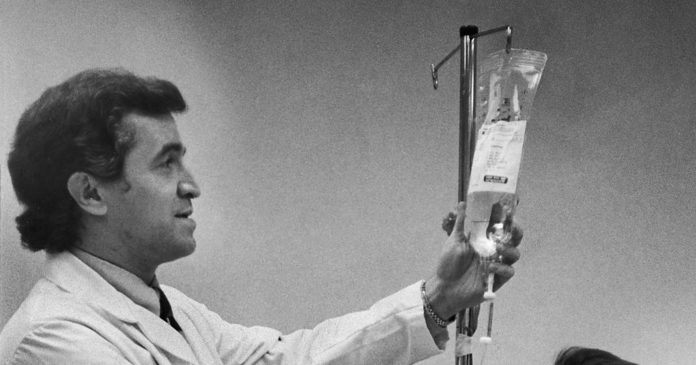The intravenous delivery of concentrated nutrients proved successful over time in stimulating and restoring normal bodily functions, including immune systems of patients with malignant growths.
The technique has not only increased the chances of survival after operations; it has also spared many patients surgery — often because a diagnosis of malnutrition had not been contemplated and nutrition was not considered a remedy.
“It’s senseless to pay $200 to $300 a day for intensive care and then not pay the extra $50 to $100 for nutrition,” Dr. Dudrick told The Times. “It’s like buying a Mercedes without any wheels on it.”
Stanley John Dudrick was born on April 9, 1935, in Nanticoke, Pa., a grandson of Polish immigrants. His father, also named Stanley, was a coal miner. His mother, Stephanie (Jachimczak) Dudrick, worked in silk and cigar factories.
He earned a bachelor of science degree in biology in 1957 from Franklin and Marshall College in Lancaster, Pa., and his medical degree from the University of Pennsylvania School of Medicine (now the Perelman School of Medicine).
In 1972, he became the founding chairman of the department of surgery at the University of Texas Medical School at Houston. He joined the Yale Medical School faculty as a surgery professor in 1994 and was named a professor of surgery at the Geisinger school in 2012.
Dr. Dudrick was the first president and founder of the American Society for Parenteral and Enteral Nutrition, and was instrumental in the founding of the Oley Foundation, a support group for TPN patients.
In addition to his sister, Ms. Brown, he is survived by his wife, Theresa (Keen) Dudrick; their daughters, Susan Burkholder, Carolyn Henry, Holly Dudrick and Anne Dudrick; their sons, Paul, a surgeon, and Stanley; 16 grandchildren; five great-grandchildren; and a brother, Daniel.
Source : Nytimes













